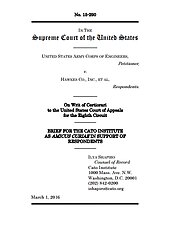United States Army Corps of Engineers v. Hawkes Co.
Learn more about Cato’s Amicus Briefs Program.
The Clean Water Act requires landowners to get a permit from the Army Corps of Engineers to discharge dredged materials into “navigable waters.” Yet there is still a vast uncertainty about what are “navigable waters” that are subject to the CWA. Therefore, before a building project is commenced, the Corps can give a landowner a “Jurisdictional Determination” (JD) to assess whether, in their opinion, a piece of property is subject to the CWA. But what happens if the Corps determines that a piece of property is subject to the CWA but the landowner wants to challenge the Corps’ determination? That is exactly the situation the Hawkes Company faced. After the Corps issued a JD that the company’s land was subject to the CWA, the company filed an action with a federal district court in Minnesota challenging the determination. The Corps moved to dismiss the complaint, arguing that the JD was not a “final agency action” under the Administrative Procedure Act and therefore the company could not challenge it. Although the APA was enacted to protect the rights of citizens to challenge agency actions, the district court nevertheless found that the JD was not challengeable. The United States Court of Appeals for the Eighth Circuit disagreed, however, and permitted the company to challenge the JD. The government then appealed to the Supreme Court, where the case is now. In a brief supporting the Hawkes Company, Cato argues that the Court should not only sustain the Eighth Circuit, but that it should roll back some impediments to bringing challenges under the APA. The APA creates a strong presumption of judicial review, but, in a case called Bennett, the Supreme Court added an extra step—whether the agency’s action is final—that is not found in the text of the APA. We argue that the Court should replace the finality rule in Bennett with a straightforward, pragmatic application of the APA’s text. That would make this an easy case: When the Corps issued the JD, it was a final statement of its position on whether the property owner would be subject to the CWA. The Hawkes Company should be able to challenge this determination without having to overcome a burdensome standard that goes against APA’s presumption of judicial review.

This work is licensed under a Creative Commons Attribution-NonCommercial-ShareAlike 4.0 International License.


